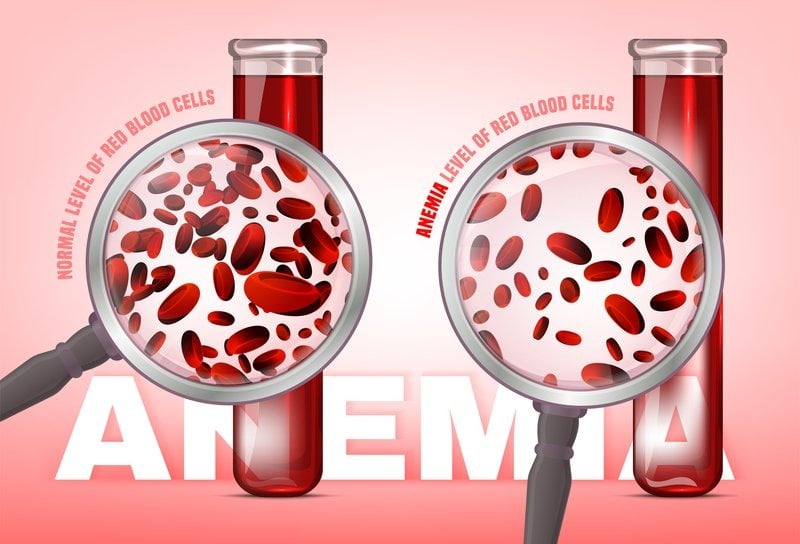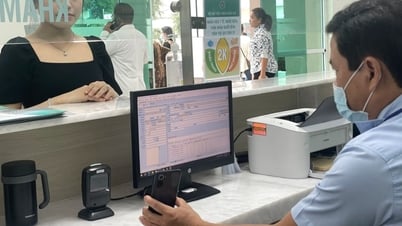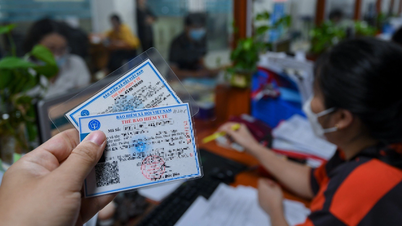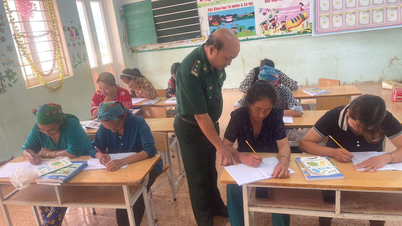Ignoring the signs, many patients are hospitalized in serious condition.
Associate Professor, Dr. Nguyen Tuan Tung, Director of the Center for Hematology and Blood Transfusion, Deputy Director of Bach Mai Hospital, said that many patients were hospitalized in serious condition because they ignored the initial signs that seemed harmless.
 |
| Illustration photo. |
According to him, there are at least six symptoms that people need to pay special attention to. The first is a state of persistent fatigue despite adequate rest. This could be a sign of anemia or bone marrow disorders - diseases that cannot be ignored.
The second is pale skin, pale lips, and white palms. This is a sign that the body is lacking hemoglobin, an important component of the blood that is responsible for transporting oxygen.
The third sign is abnormal bleeding, such as nosebleeds, bleeding gums, prolonged menstruation or subcutaneous bleeding. These manifestations may be related to blood clotting disorders, thrombocytopenia or even malignancy.
Another warning is rapid weight loss without a clear cause, even if the patient is not dieting or exercising excessively. This can be a sign of malignant blood diseases such as leukemia or lymphoma.
Fifth, prolonged fevers without a clear cause can be mistaken for a common viral infection but may actually be related to a weakened immune system or a blood disorder. Finally, painless swelling of lymph nodes in the neck, armpits or groin that lasts for several days may be a warning sign of lymphoma or leukemia that requires immediate medical attention.
Associate Professor, Dr. Nguyen Tuan Tung emphasized that not everyone with one of the above signs has a serious illness. However, when symptoms persist, recur or appear simultaneously, the patient needs to go to a specialized medical facility for thorough examination and screening. Early diagnosis plays an important role in the successful treatment of many hematological diseases, especially malignant diseases.
At the Hematology and Blood Transfusion Center, Bach Mai Hospital, patients will receive comprehensive examinations, from basic blood tests to specialized techniques such as bone marrow aspiration, biopsy or gene mutation analysis if necessary. The center currently successfully treats many diseases from benign diseases such as anemia, hemolysis, to complex diseases such as acute leukemia, multiple myeloma, lymphoma.
Treatment regimens here are individualized for each patient, combining many modern methods such as chemotherapy, immunotherapy, blood transfusion, stem cell transplantation, and even CAR-T cell therapy - an advanced method in the treatment of blood cancer. Patients are closely monitored throughout the treatment process, with multidisciplinary coordination to ensure the highest efficiency and optimal recovery.
Associate Professor, Dr. Nguyen Tuan Tung advises the community to listen to their bodies. When abnormal signs persist, do not be subjective and do not self-treat at home. Early examination not only helps detect diseases in time but is also the key to effective treatment, avoiding dangerous complications and protecting the health of yourself and your family.
Rectal neuroendocrine tumors are benign in the early stages but can become malignant and metastatic if not detected and treated promptly. Thanks to modern endoscopic methods, many patients have been diagnosed early and the tumor has been completely removed even before there are obvious symptoms.
Detection and removal of rectal neuroendocrine tumors by endoscopy
Ms. Th. (42 years old, Lam Dong ) came to the hospital for a routine health check-up. During the colonoscopy, the doctor discovered two small lesions under the rectal mucosa, measuring only 2 - 5 mm.
She was assigned endoscopic mucosal resection (EMR), removing the entire tumor without damaging the digestive tract. After 15 minutes of the procedure, Ms. Th. no longer felt pain and was able to leave the hospital the same day. The pathology results determined that this was a benign neuroendocrine tumor. However, she still needs to have regular check-ups and endoscopy as instructed by the doctor.
Similarly, Ms. Tr. (28 years old, Tay Ninh ) came to the clinic due to prolonged abdominal pain and digestive disorders. Endoscopy detected an 8 mm submucosal tumor in the rectum, suspected of being a neuroendocrine tumor. Endoscopy ultrasound showed that the tumor was located near the muscle layer.
The patient was indicated for endomucosal submucosal dissection (ESD), a minimally invasive but effective intervention method. After 30 minutes of performing, the tumor was completely removed, Ms. Trang had no pain and was discharged the same day.
According to Dr. Tran Thanh Binh, Center for Endoscopy and Endoscopic Surgery of the Digestive System, Tam Anh General Hospital, Ho Chi Minh City, neuroendocrine tumors are tumors originating from nerve cells and hormone-secreting cells, often appearing in the digestive tract and lungs.
In the rectum alone, tumors account for about 12 - 27% of neuroendocrine tumor cases. "The danger is that this type of tumor has the risk of becoming malignant and metastasizing early. Early detection and intervention play a decisive role in completely removing the tumor, minimizing complications and prolonging life expectancy," Dr. Binh emphasized.
Currently, with the development of modern endoscopic techniques such as endoscopic mucosal resection (EMR), endoscopic submucosal dissection (ESD), or full-thickness resection, doctors can completely remove tumors while preserving the digestive tract, helping patients recover quickly, with less cost and limiting the risk of open surgery.
However, the endoscopic method is usually only applied to tumors smaller than 10 mm and without signs of malignancy such as ulcers, deep depressions or surface blood vessel dilation. In suspicious cases, the doctor will prescribe additional diagnostic tools such as endoscopic ultrasound, CT scan or MRI to assess the level of invasion and decide on the appropriate treatment plan.
Statistics show that about 90% of rectal neuroendocrine tumors are detected at an early stage, when the tumor is still small and not yet invasive. However, if detected late, when the tumor has metastasized to the liver, lungs or lymph nodes, treatment becomes more complicated and the prognosis for life is significantly reduced.
Doctor Binh also said that the recent discovery of many cases is not necessarily due to a sudden increase in the disease, but partly due to improved disease screening awareness among the people.
In addition, the recommended age for colorectal cancer screening has now been reduced to 45 years old instead of 50 years old as before. Along with that, endoscopy technology is increasingly modern, with 4K resolution images, magnification up to 150 times and digital staining techniques to help doctors identify the smallest lesions that are difficult to detect with the naked eye.
The exact cause of neuroendocrine tumors is still unknown. Some of the risk factors that have been recognized include gene mutations, genetic factors, chronic inflammation, smoking, alcohol abuse, and being male over 40 years of age.
In the early stages, neuroendocrine tumors often have no obvious symptoms and can be easily confused with common digestive disorders such as abdominal pain, changes in bowel habits or gastrointestinal bleeding. Therefore, doctors recommend that people should have regular colorectal cancer screening, especially if there are risk factors or unusual symptoms.
HP - The silent culprit causing stomachache and gastric ulcers in children
Th., 13 years old, was hospitalized due to severe abdominal pain accompanied by fatigue and dizziness. After examination, doctors diagnosed him with gastroduodenal ulcer caused by helicobacter pylori (hp) infection, leading to gastrointestinal bleeding and severe anemia.
Doctor Nguyen Huu Bao Han, Department of Pediatrics, Tam Anh General Hospital, Ho Chi Minh City, said that the baby was actively treated with blood transfusion, fluid replacement and drugs to inhibit gastric acid secretion. After 3 days in the hospital, the baby was discharged and continued to be injected with acid inhibitors for 2 weeks, then switched to oral form and returned for follow-up visits according to the appointment schedule.
Before that, baby Th. had a dull stomach ache that lasted for more than a year. The family thought it was due to “weak intestines” so they only gave him digestive enzymes but it did not improve. Late last year, he had a gastrointestinal bleeding and was treated with acid-suppressing drugs. However, due to lack of close monitoring, the disease relapsed and became more severe.
At the time of emergency, the baby's hemoglobin index was only 7.3 - 7.9 g/dl, while the normal level in children is 11 - 14 g/dl, indicating that the baby had severe acute anemia. After receiving intravenous fluids and hemostatic drugs, the baby was transferred to Tam Anh Hospital in Ho Chi Minh City for further treatment.
Dr. Han emphasized that because the child has a history of bleeding and unhealed injuries, the risk of recurrence is still high, the child needs to be closely monitored, and must adhere to a strict diet and rest regimen. Parents should take their child to the hospital immediately if they have signs such as severe abdominal pain, vomiting blood, black stools, fatigue, and paleness.
Peptic ulcer is a condition of damage to the lining of the stomach or duodenum, causing symptoms of epigastric pain, nausea, loss of appetite, weight loss, and pallor. The disease can occur in both adults and children.
HP bacteria is the main cause of 70 - 90% of cases of gastric and duodenal ulcers. This bacteria is transmitted through saliva, shared food or poor hygiene. Notably, more than 80% of infected people have no obvious symptoms, leading to the disease progressing silently and for a long time.
If not detected and treated promptly, gastric ulcers can cause serious complications such as gastrointestinal bleeding, gastric perforation, pyloric stenosis, anemia and even stomach cancer.
To prevent HP and duodenal ulcers in children, Dr. Han advises parents to guide their children to eat hygienically, limit sharing eating utensils, avoid spicy, fried foods, carbonated drinks, coffee, and strong tea. At the same time, it is necessary to ensure that children get enough rest, do not get too much stress in their studies and life, control stress and go to the doctor promptly when there are unusual signs.
Experts also recommend that prolonged abdominal pain, whether mild or dull, should not be taken lightly in children. Early examination and detection of hp infection and gastroduodenal ulcers help treat effectively, prevent dangerous complications later, and protect children's overall health.
Source: https://baodautu.vn/tin-moi-y-te-ngay-116-chuyen-gia-chi-ra-6-dau-hieu-som-cua-benh-mau-can-duoc-tam-soat-d302141.html



































































































Comment (0)